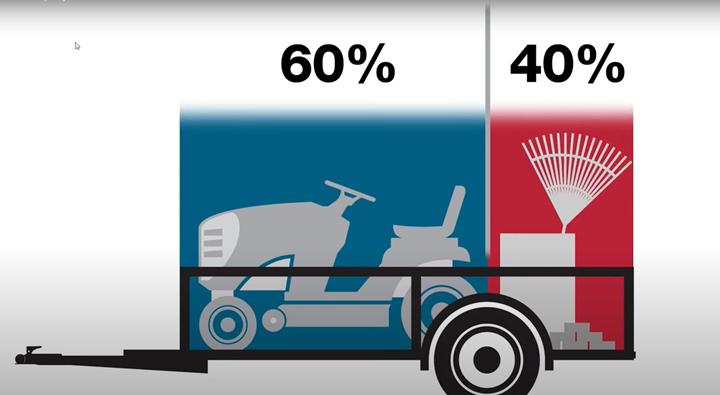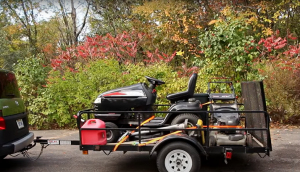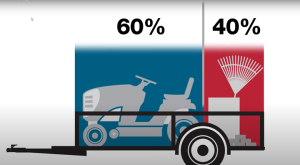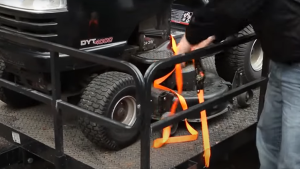
How to Load a Trailer Hitch – Part 1 (Go to Part 2 here): Towing a trailer can open up a world of possibilities, from embarking on adventurous road trips to hauling essential cargo. However, improperly loading a trailer hitch can transform this exciting venture into a dangerous one. According to the National Highway Traffic Safety Administration (NHTSA), trailer sway contributes to numerous accidents each year. Ensuring your trailer hitch is loaded correctly isn’t just about convenience—it’s a crucial safety measure that can prevent deadly mishaps on the road.
In this comprehensive guide, we’ll explore the critical techniques and best practices for loading a trailer hitch correctly to avoid trailer sway. We’ll discuss the fundamentals of weight distribution, choosing the right hitch, securing your load, and essential driving tips to keep you and others safe. Whether you’re a seasoned tower or a beginner, these invaluable insights will enhance your towing experience and give you the confidence to haul anything with peace of mind.
1. Understanding Trailer Weight and Balance

Proper weight distribution is the cornerstone of safe towing. Incorrect weight balance can lead to trailer sway, significantly increasing the risk of accidents. Here’s what you need to know about trailer weight and balance:
- Weight Distribution: Maintaining an even weight distribution across your trailer is essential. Uneven loads can cause the trailer to sway or fishtail, making it difficult to control.
- Gross Trailer Weight (GTW): GTW is the total weight of the trailer, including its cargo. It’s crucial to know your trailer’s GTW to ensure it doesn’t exceed your vehicle’s towing capacity. Overloading can strain your vehicle, impede performance, and increase the likelihood of an accident.
- Tongue Weight: Tongue weight refers to the downward force exerted by the trailer onto the hitch. It should typically be between 10-15% of the GTW. Too little tongue weight can cause the trailer to sway, while too much can overload your vehicle’s rear axle, leading to poor handling and braking performance. Using a tongue weight scale can help you measure and adjust this critical aspect accurately.
Balancing your trailer weight properly not only enhances safety but also improves fuel efficiency and prolongs the lifespan of your vehicle and trailer.
2. Choosing the Right Trailer Hitch
Selecting the appropriate trailer hitch is fundamental for safe towing. Different hitches are designed for various loads and purposes. Here’s how to choose the right one for your needs:
Types of Trailer Hitches
- Ball Mount Hitches: These are the most common and are suitable for lightweight to medium loads. They consist of a ball and a receiver, allowing for easy attachment and detachment.
Weight-Distributing Hitches: Ideal for heavier loads, these hitches use spring bars to distribute the trailer’s weight more evenly across the vehicle’s axles. This helps maintain control and reduces sagging. - Fifth-Wheel Hitches: Typically mounted in the bed of a pickup truck, these hitches provide a high level of stability and are suitable for very heavy loads.
- Gooseneck Hitches: Similar to fifth-wheel hitches but designed for agricultural and commercial trailers. They offer strong towing capabilities and are also mounted in the truck bed.
Matching Hitch to Vehicle and Load
It’s crucial to match the hitch to both your vehicle and the load you plan to tow. Check your vehicle’s owner manual for towing specifications and ensure the hitch you choose meets these requirements. Make sure the hitch is rated for the GTW and tongue weight of your trailer to ensure optimal performance and safety.
By choosing the right trailer hitch, you enhance towing stability and ensure a safer journey, reducing the risk of sway and other towing-related issues.
3. Proper Loading Techniques

Properly loading your trailer is essential to avoid trailer sway and ensure a safe towing experience. Follow these techniques to load your trailer correctly (here’s a great video, curtesy of CURT – Advance Auto Parts, USA):
Loading the Trailer:
- Positioning Heavy Items: Place the heaviest items over the trailer’s axle or slightly towards the front of the trailer (closer to the tow vehicle). This means positioning the heavy items just forward of the axle to ensure better weight distribution. Distribute approximately 60% of the load towards the front of the trailer (closer to the tow vehicle) and 40% behind. Distribute the weight evenly from side to side to maintain balance.
Why It’s Important: Incorrect positioning of heavy items can lead to trailer sway or fishtail, causing loss of control, especially at higher speeds or during emergency maneuvers, and increasing the risk of accidents.
- Securing the Load: Use high-quality straps, ropes, or chains to secure your load. Ensure that all items are tightly fastened, minimizing any movement during transit.
Why It’s Important: An unsecured load can shift during transit, altering the balance and potentially causing the trailer to jackknife or sway. This can also result in items falling out, posing hazards to other drivers.

Step-by-Step Guide:
- Prepare the Trailer: Ensure the trailer is on a flat, stable surface. Chock the wheels to prevent any movement during loading.
- Distribute Weight Evenly: As you load the trailer, make sure the weight is evenly distributed. Place heavy items first, positioning them over or just forward of the axle. Then, arrange lighter items around them, with the lightest items secured on top.
Why It’s Important: Uneven weight distribution can cause instability, making it harder to control the trailer. This can lead to increased fuel consumption, tire wear, and a higher chance of rollovers. - Maintain Proper Tongue Weight: Check the tongue weight as you load. It should be 10-15% of the GTW. Adjust the load as needed to maintain this balance.
Why It’s Important: Incorrect tongue weight can either lift the rear of the tow vehicle (if too light) or overload it (if too heavy), both of which compromise handling, braking, and overall towing stability. - Secure the Load: Once everything is loaded, use straps, bungee cords, or rope to secure all items. Ensure there is no loose cargo that can shift during transit.
- Double-Check: Walk around the trailer, check for any loose items, and ensure the load is balanced and secure.
Why It’s Important: A final check ensures that all previous steps were followed correctly, preventing potential issues on the road. - Plan for a Stop on Longer Trips: For longer trips, plan for a stop some 15 to 30 minutes into the trip to re-verify and retighten any straps that may have come loose.
Why It’s Important: During the initial stages of the trip, the load may shift slightly, causing the straps to loosen. A quick stop to recheck ensures everything remains secure, preventing potential hazards down the road.
Properly loading your trailer not only prevents sway but also enhances control, braking performance, and overall safety on the road.
How To Load a Trailer Hitch – Get Ready For Trailer Hitch Excellence

Towing a trailer safely requires careful preparation and attention to detail. Properly loading your trailer, ensuring correct weight distribution, maintaining the appropriate tongue weight, and following essential driving tips are all crucial steps to avoid trailer sway and other towing-related issues.
Remember to perform thorough pre-trip checks and adjustments, avoid common mistakes, and take extra care when driving. These practices not only enhance your safety but also the safety of others on the road.
By adhering to these guidelines, you can enjoy a smooth and secure towing experience, whether for a short trip around Quebec or a long journey across the country.
Our team of specialists at Autotech Performance, a CAA Quebec certified automotive garage, are ready to answer your questions about how to get your vehicle prepared for towing. Simply give us a call or book an appointment online.
Enjoy safe driving!
Your Team at Autotech Performance
How to Load a Trailer Hitch – Go to Part 2 here



